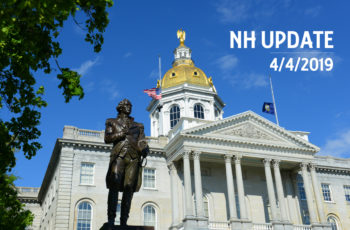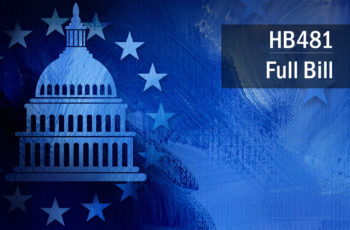Legislators Pushing for the Dream of a Cannabis Franchise System may Unleash a Nightmare on the State of New Hampshire
As of this writing, HB1633 has passed both the House Commerce Committee and full House Vote with wide support. As amended, the bill goes to great length to address the Governor’s publicly stated concerns without crossing over into the operational control issues that would de facto define our retail stores as a franchise.
However, it is no great secret that some legislators have different ideas. Highlighted by the attempt to hijack HB1633 in the House Commerce Committee and make it a State Franchise model during its first hearing.
We recently published an in-depth article on the vision of the current HB1633 bill (you can read here). In it we highlight how the agency model grants direct state regulatory control of cannabis retail via the liquor commission, keeps cannabis away from schools and children, tightly limits marketing, prevents “marijuana miles”, empowers municipalities to opt-in or out, prevents poly-drugs, keeps it ‘tax’ free and limits retail to 15 stores at rollout just as Governor Sununu outlined publicly.
The only missing criteria is a prohibition on retailer owners lobbying the government. The bill’s bipartisan sponsors, Representatives Erica Layon and Anita Burroughs, have an amendment ready to go that adds language to address the Governor’s final concern.
Even though HB1633 addresses the Governor’s criteria (following the above mentioned amendment), for some reason, some legislators appear hell bent on franchise or nothing. So let’s explore that concept to talk honestly about what that model looks like in practice.
Understanding Licensing Structures, Roles of the State and the Risk Involved
At first blush we understand the thinking behind a State franchise model for cannabis retail outlets. The logic stems from the challenges of a State legal industry that is federally illegal.
Many brilliant minds contemplated the solution to this over decades, and the consensus is what you see in traditional licensing models where the legislative body creates an independent regulatory body (usually a Cannabis Commission).
All the plant touching activities happen by private actors under the Commission, and if the Commission reports anywhere, it is usually sideways to another department. In other words, there is no straight line from the plant touching cannabis activity to the State.
A couple of years ago there was a bill proposing the State run the retail stores themselves. This concept is the State as the actual plant touching cannabis company. No arms length separation at all. Yikes!
As you can imagine, that opens New Hampshire up to direct Federal action, putting the States property, money and our executive branch in peril of investigation of breaking Federal law. Thankfully, our legislature finally grasped this reality and decided against it.
Then came the franchise concept, the charge of the Cannabis Commission from fall of 2023. At a high level you can make the case that the State as a cannabis franchisor provides one arms length distance between the State and the plant touching activity. However, upon deeper review, this model may actually increase risk for the State.
Moving past the repugnant moral issue of the State directly involving itself in an industry whose product was used against so many people and/or it being a suspect industry model that would ensure only the wealthy and connected get to participate there are deeper, more nightmarish issues involved.
Why the Franchise Model is High Risk
As mentioned above, if you meet three basic criteria laid out by the Federal Government, you are a franchise whether you call yourself one or not. If the State of New Hampshire is a franchise, it will then be regulated by the Federal Trade Commission and bound by Federal Franchise Regulations.
This means if one franchisee were to file a complaint with the FTC, and the FTC found it to have merit, the FTC could launch an investigation into the State of New Hampshire.
They could subpoena executive branch emails, text messages, computers, cell phones and other information and devices. It would put the States bank accounts, owned buildings, equipment and property in peril.
In one draft of a franchise model bill we viewed, the law enforcement apparatus of the State of New Hampshire may be able to assist Federal law enforcement in their investigation!
And what if a customer of a State Franchised store has an adverse outcome from an event in the store or negligence in product handling? That customer could sue the Franchisee, Franchisor and lodge a complaint with the FTC.
Faced with these possible risks we’d suspect not all pro cannabis senators would want their fingerprints on that type of bill if the worst was to happen. At a minimum, they should be honest about understanding these very real and substantial risks to our state and our residents and that they intend to move forward with a franchise model in spite of them.
What Do the Professionals Say About the Franchise Model?
But don’t take our word for it. In a Marijuana Venture article titled When Cannabis and Franchise Laws Collide they write…
“…despite state legality, technically the federal government could shut down a franchisee’s operation or the franchisor’s (which would have the same effect).”
Source: https://www.marijuanaventure.com/when-cannabis-and-franchise-laws-collide/
In yet another of their articles titled Franchising and the Cannabis Industry they outline that…
“Federal and state franchise agencies have broad powers to punish franchise law violators and may freeze assets, order restitution, issue cease-and-desist orders, ban violators from selling franchises and recover substantial penalties.”
“Even in states without a franchise sales law, a franchisee may be able to pursue a claim for violation of a state unfair trade practices and recover treble damages and attorneys’ fees based on the promoter’s violation of the federal franchise sales law. State franchise laws impose personal, joint and several liability on the franchisor’s management and owners even if the franchisor is a legal entity. Because a franchise finding is highly fact-specific, seldom are franchise allegations dismissed early in a case on a motion to dismiss, which significantly adds to the nuisance value of franchise disputes.”
Source: https://www.marijuanaventure.com/franchising-and-the-cannabis-industry/
Legislators routinely tout that small business is the New Hampshire way, just not for cannabis it seems. One only has to look toward Vermont for aspects of a small businesses centric foundation for the industry. WCAX.com authored a piece titled How Cannabis Growers Want Vermont’s Budding Industry to Take Shape.
“Vermont’s legal cannabis market has been open now for just over a year. As it evolves, the Vermont Growers Association hopes to outline the guiding principles for the future of the market.”
“We kind of hold our pride to doing this the right way,” said Dusty Kenney of the Cambridge Cannabis Company.”
“I think that one of the things that makes Vermont special is our access to so many small cultivators and manufacturers and retailers, and this is really one of the things that makes it great here,” said Colleen McQuade of the Cannabis Retailers Association of Vermont.”
“Vermont’s Cannabis Control Board says these principles are squarely in line with their own strategic vision for the future of the cannabis industry, especially the focus on small, locally produced craft products.”
Source: https://www.wcax.com/2023/11/14/how-cannabis-growers-want-vermonts-budding-industry-take-shape/
We echo their sentiments for sure.
Has Any State Attempted a State Run Model?
We are glad you asked. Indeed, the country’s first government-run dispensary was launched in North Bonneville, Washington in 2015. By 2018 it was struggling to break even and was granted permission to move to a larger market in Stevenson, Washington. Sales never exceeded break-even status and ultimately in 2021 their city council decided the business was a liability, dissolved the public development authority and sold the store.
While the legislators pushing for the franchise model may sincerely believe it was a solution to consider, there is no getting past the fact that their dream of a New Hampshire cannabis franchise system is a nightmare waiting to happen.
What can you do to help?
- Sign Our Petition to Support HB1633
- Contact your State Representative in support of HB1633
- Contact your Senator in support of HB1633
Want to support our work? Consider making a donation or becoming a corporate member. Every contribution helps us to fight for cannabis reform in New Hampshire!
HELP SPREAD THE WORD!
Also, a reminder to visit our digital media properties at the links below. Like, follow, request access and share with like minded people in your network.
If you would like to be considered to charter a networking group in Portsmouth, Concord and points west contact us today.
JOIN US ONLINE
- NHCann Manchester Networking Group: https://www.facebook.com/groups/2925591894124493
- NHCann North Country Networking Group: https://www.facebook.com/groups/2949979955281110
- NHCann Nashua Networking Group: https://www.facebook.com/groups/225983842586886
- Like our NHCann Facebook page: https://www.facebook.com/NHCannAssociation/
- Minds.com: https://www.minds.com/nhcannabisassociation/
- Instagram: https://www.instagram.com/nhcann/
- LinkedIn: https://www.linkedin.com/company/14044550
- Leafwire: https://www.leafwire.com/profile/company/5cc20da14d6ae9665d35cc40
- Twitter: https://twitter.com/NhcannO



